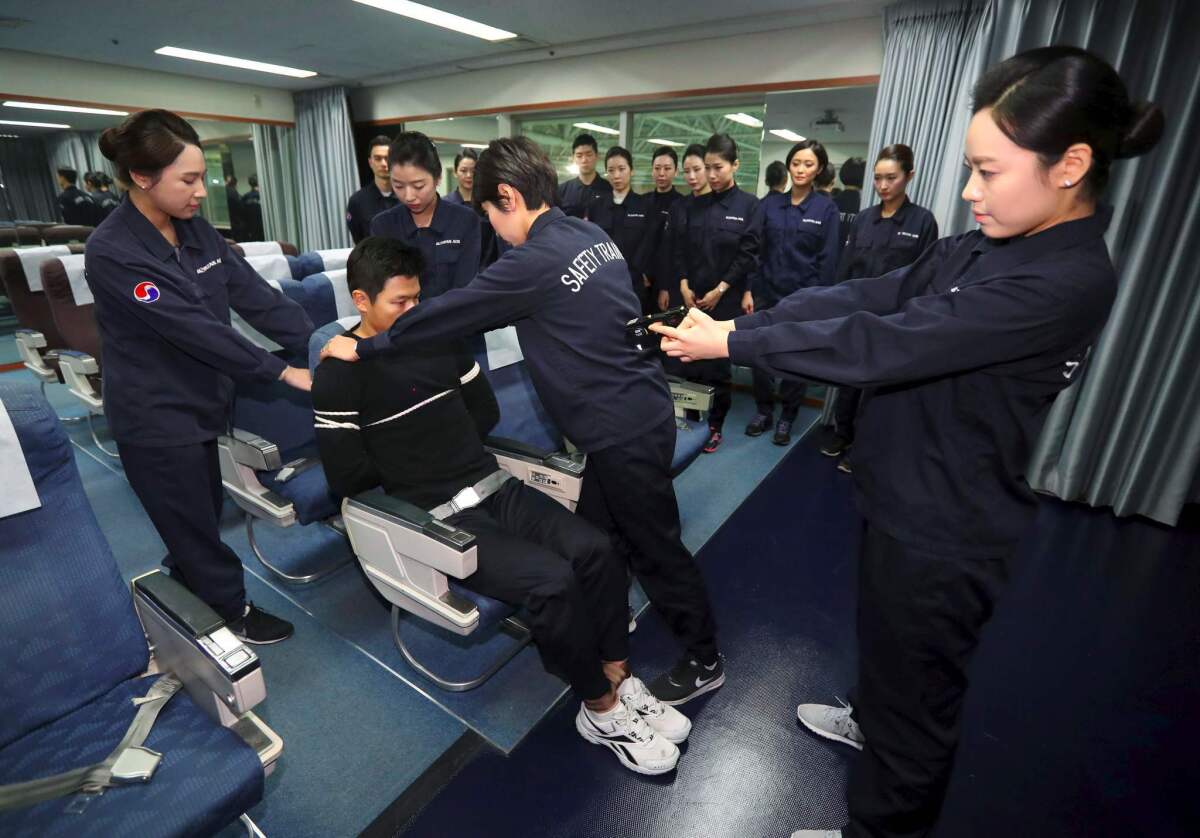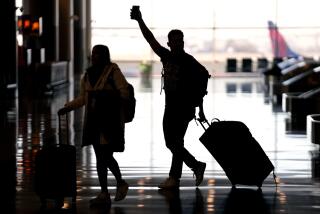Crackdown on passengers who get unruly on international flights starts Jan. 1

Passengers who make trouble on international flights beware.
An amendment to a global treaty will soon make it easier for countries to prosecute passengers on international flights who cause disruptions, delays or threaten the safety of the flight by tussling with other passengers or flight attendants.
Incidents involving unruly passengers had become less frequent but the offenses had become more serious, according to a study by an international airline trade group two years ago. But about 60% of the onboard crimes have gone unpunished, the study found.
The problem stems from a 1963 agreement among 186 countries, known as the Tokyo Convention, that gave jurisdiction over prosecuting an unruly passenger to the nation where the plane is registered. That means that fliers who gets drunk and belligerent on an American Airlines flight to France can be prosecuted only in the U.S., where American Airlines is registered, not in France, where the plane lands.
Last week, Nigeria joined with 21 other countries to ratify an amendment to the Tokyo Convention, giving the amendment the necessary support for the change to go into effect Jan. 1. The amendment allows countries where the plane lands to prosecute a troublemaker on an international flight.
“Everybody on board is entitled to enjoy a journey free from abusive or other unacceptable behavior,” Alexandre de Juniac, director general and chief executive of the International Air Transport Assn., a trade group for the world’s airlines, said in a statement. “But the deterrent to unruly behavior is weak.”
The necessary 22nd nation to ratify the amendment came on Nov. 26 when the secretary general of the International Civil Aviation Organization, Fang Liu, accepted the endorsement of the amendment from Nigeria.
“The protocol addresses the issue of rising incidents of unruly and disruptive behavior on board aircraft by significantly improving the ability of [countries] to expand jurisdiction over relevant offenses and acts to the [countries] of landing and the [country] of the operator,” Liu said in a statement. “The protocol will also serve to enhance global aviation security provisions by expressly extending legal recognition and protections to in-flight security officers.”
In 2017, there were 8,731 incidents of unruly passengers on flights operated by airlines that are members of IATA, the airline trade group, compared with 9,837 in the previous year. A vast majority of the incidents involve excessive drinking, according to an IATA study.
But the number of serious incidents on planes increased. The cases in which passengers brandished weapons or threatened the lives of passengers or crew members jumped to 279 in 2017 from 66 in 2016, according to IATA.
Extremely serious incidents — defined as a breach of the flight deck, an act of sabotage or a credible threat of seizing the aircraft — rose to 50 in 2017 from 20 in 2016, IATA said.
The cost of diverting a plane due to an unruly passenger can range from $10,000 to $200,000, depending on the circumstances, the trade group estimated.
In the U.S., the FAA said it recorded 90 incidents of unruly passengers in 2017, down from 101 incidents the previous year. In 2000, the agency increased the fine for causing a disturbance on a plane from $1,100 to as much as $25,000.
“The safety and well-being of every traveler is and will remain the highest priority for U.S. airlines,” said Katherine Estep, a spokeswoman for Airlines for America, a trade group for the biggest air carriers in the U.S. “Our members take these matters seriously, and inappropriate behavior toward crew or passengers is not tolerated.”
A man who was accused of sexually assaulting a seatmate on a 2017 flight from Los Angeles to Panama may have escaped prosecution because of confusion over who has jurisdiction over pursuing crimes on international flights.
The problem of unruly fliers has prompted some airlines to take unusual measures.
In 2016, a passenger attacked other fliers and flight attendants on a Korean Air flight from Vietnam to South Korea.
In response, Korean Air began to beef up its security measures, including improved training of flight attendants in the use of stun guns. Airlines representatives also said the carrier was considering assigning at least one male flight attendant on each flight to help subdue disorderly fliers.
More to Read
Inside the business of entertainment
The Wide Shot brings you news, analysis and insights on everything from streaming wars to production — and what it all means for the future.
You may occasionally receive promotional content from the Los Angeles Times.









